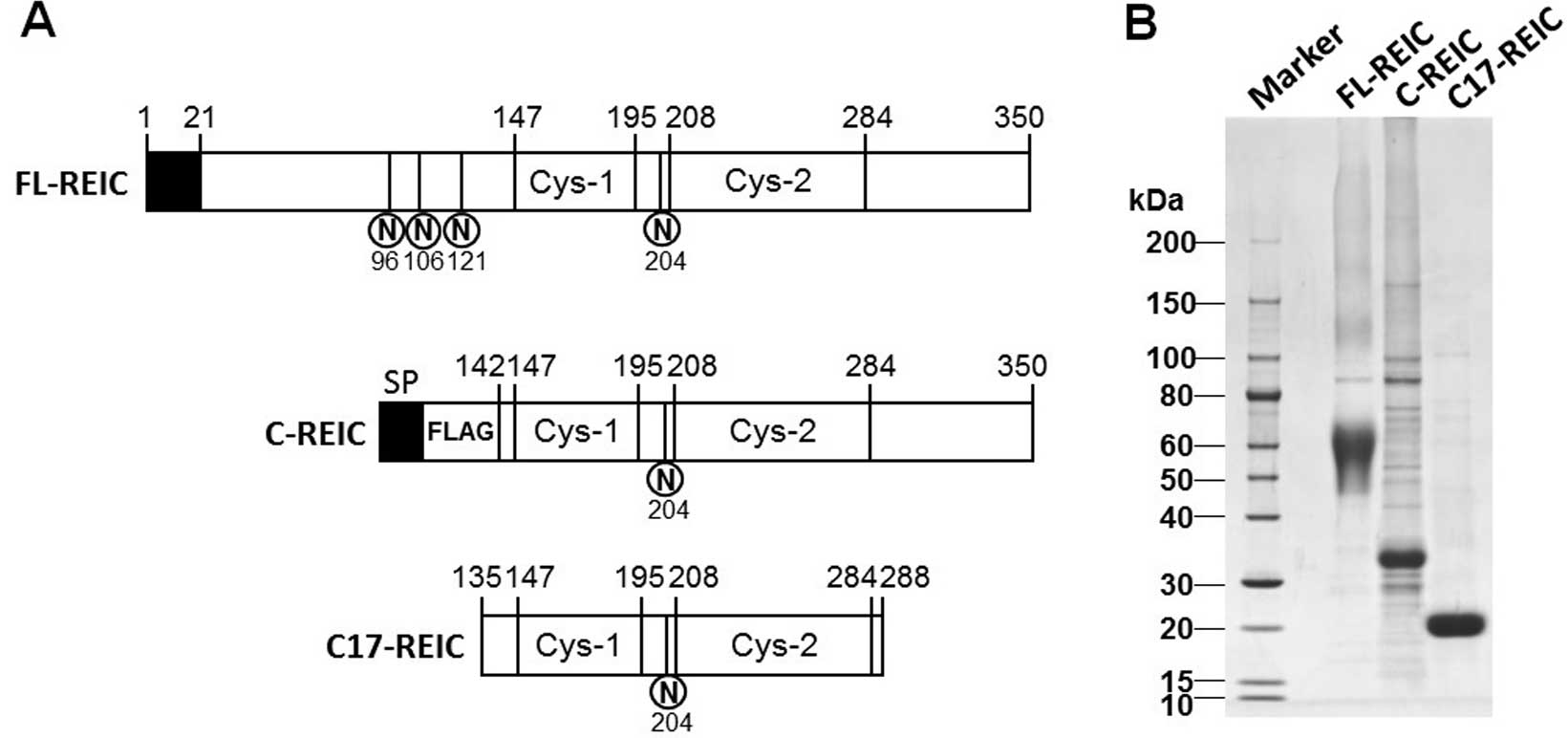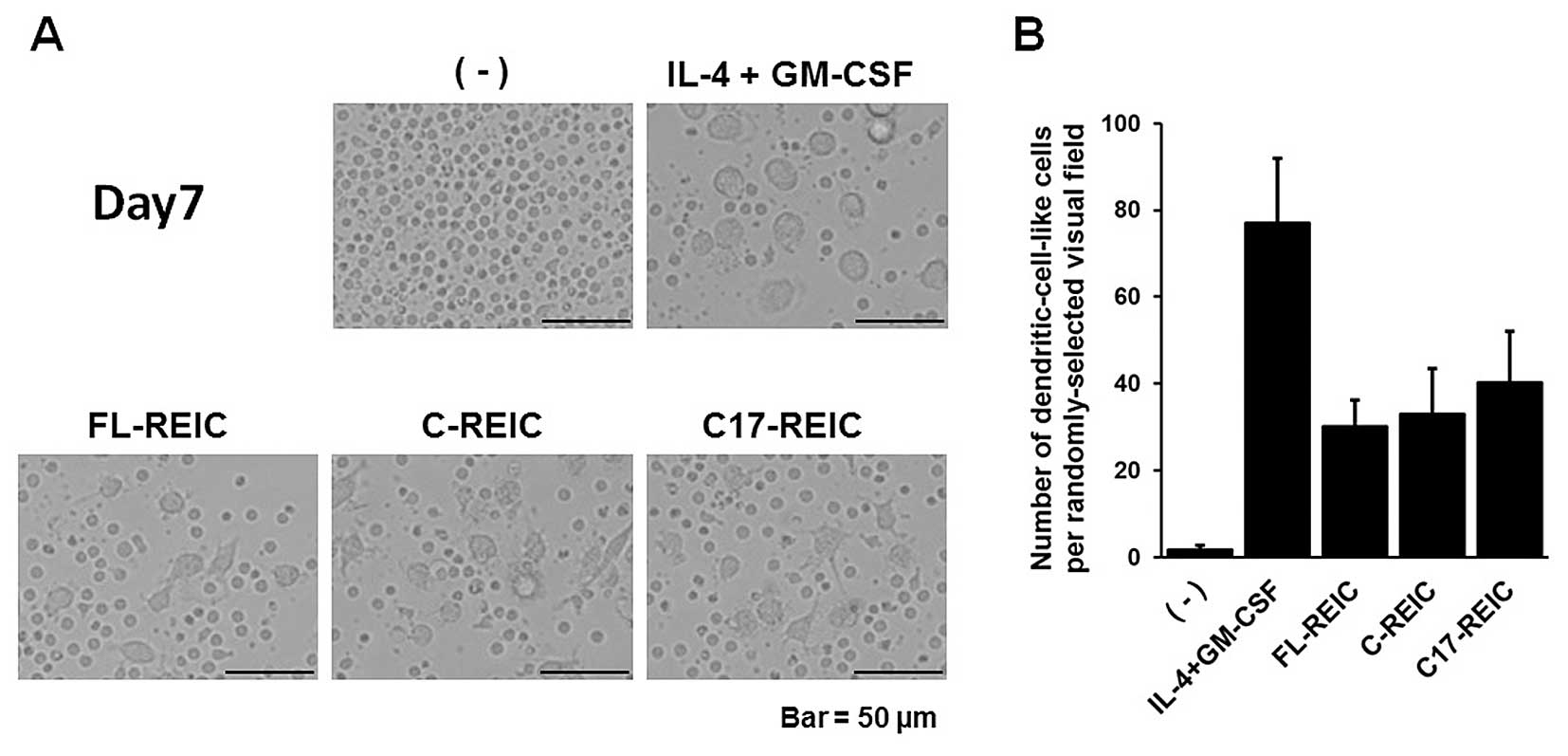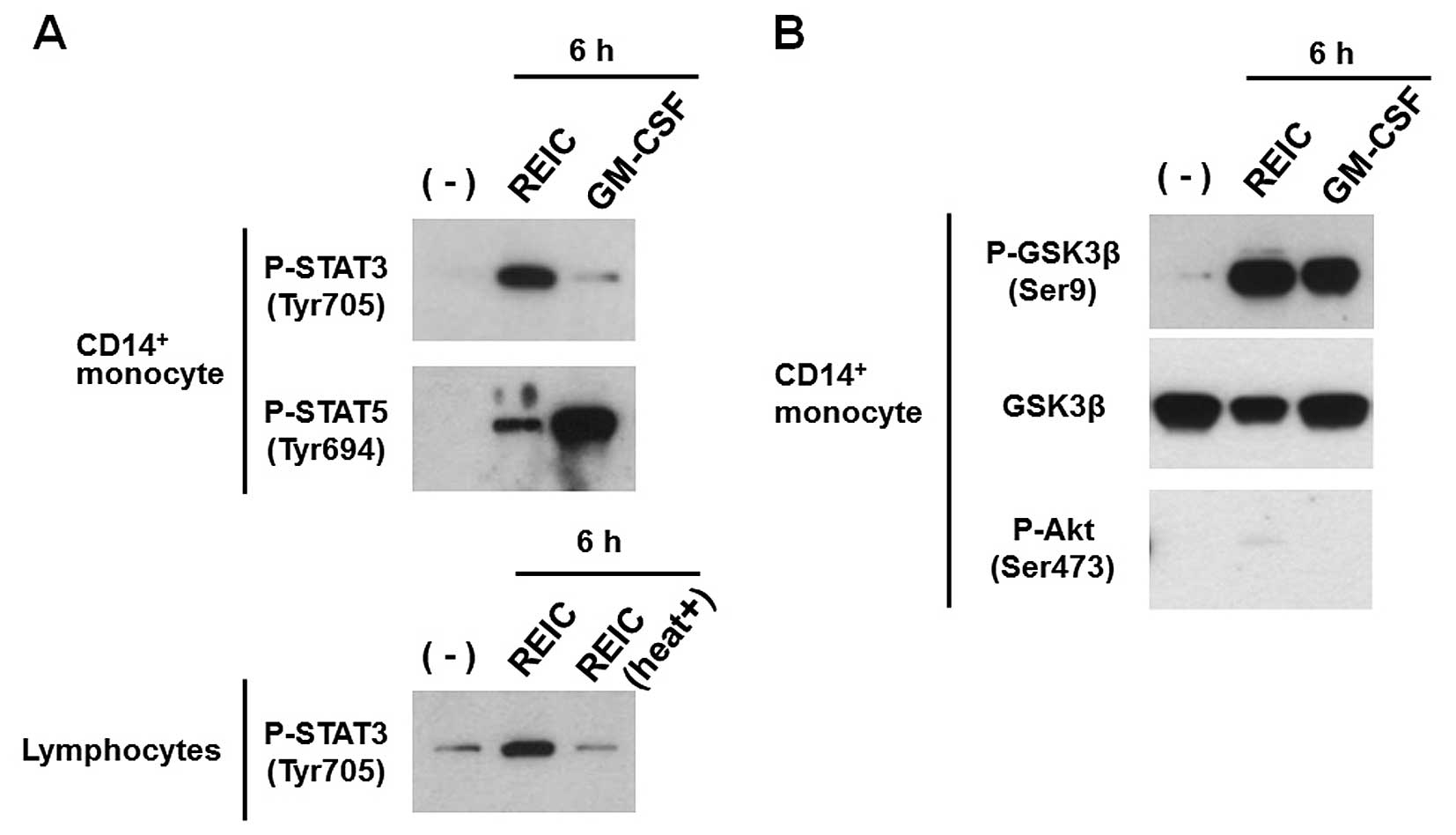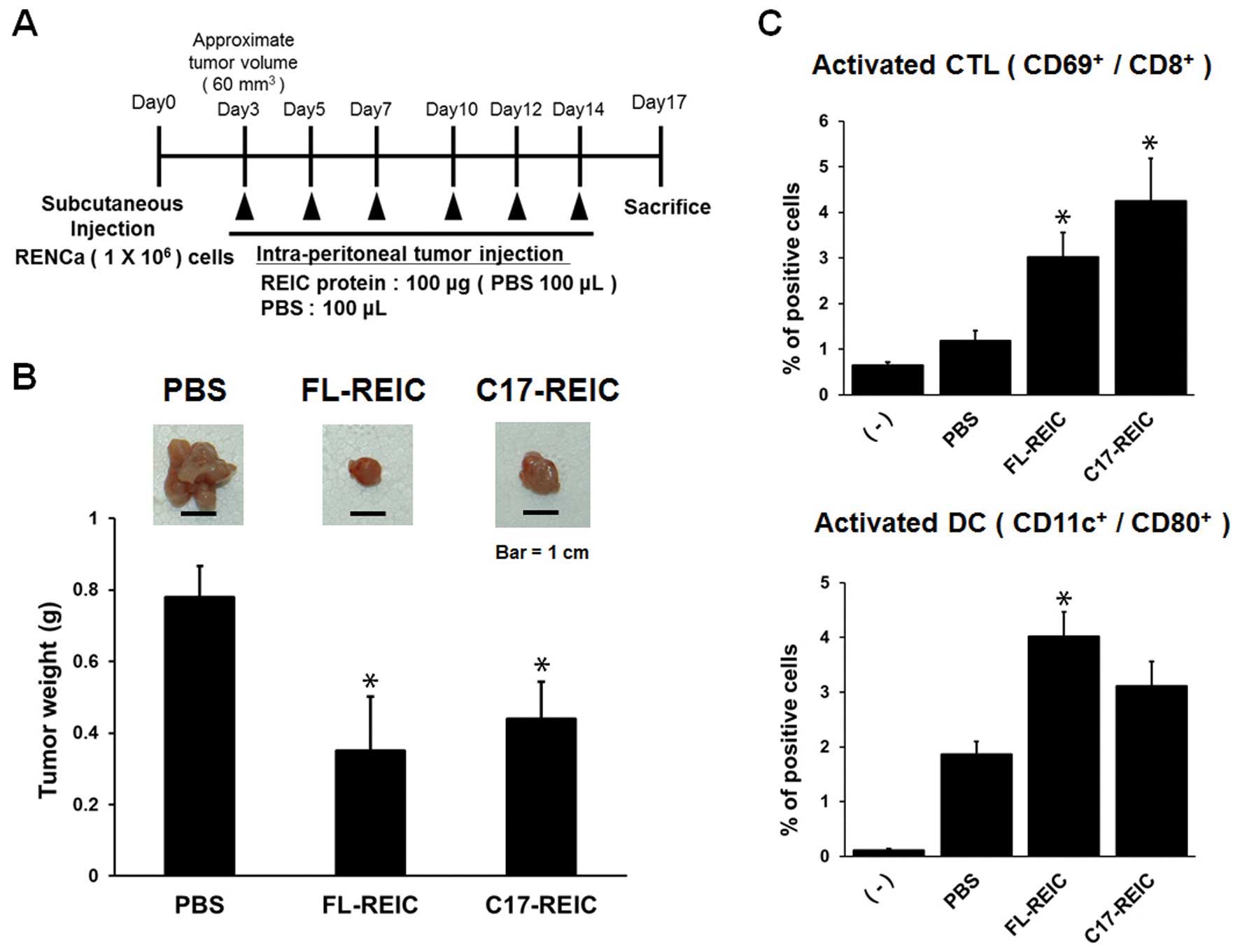|
1
|
Krupnik VE, Sharp JD, Jiang C, et al:
Functional and structural diversity of the human Dickkopf gene
family. Gene. 238:301–313. 1999. View Article : Google Scholar : PubMed/NCBI
|
|
2
|
Niehrs C: Function and biological roles of
the Dickkopf family of Wnt modulators. Oncogene. 25:7469–7481.
2006. View Article : Google Scholar : PubMed/NCBI
|
|
3
|
Mao B, Wu W, Li Y, et al:
LDL-receptor-related protein 6 is a receptor for Dickkopf proteins.
Nature. 411:321–325. 2001. View
Article : Google Scholar : PubMed/NCBI
|
|
4
|
Li L, Mao J, Sun L, Liu W and Wu D: Second
cysteine-rich domain of Dickkopf-2 activates canonical Wnt
signaling pathway via LRP-6 independently of dishevelled. J Biol
Chem. 277:5977–5981. 2002. View Article : Google Scholar
|
|
5
|
Cheng Z, Biechele T, Wei Z, et al: Crystal
structures of the extracellular domain of LRP6 and its complex with
DKK1. Nat Struct Mol Biol. 18:1204–1210. 2011. View Article : Google Scholar : PubMed/NCBI
|
|
6
|
Nakamura RE and Hackam AS: Analysis of
Dickkopf3 interactions with Wnt signaling receptors. Growth
Factors. 28:232–242. 2010. View Article : Google Scholar : PubMed/NCBI
|
|
7
|
Fujii Y, Hoshino T and Kumon H: Molecular
simulation analysis of the structure complex of C2 domains of DKK
family members and β-propeller domains of LRP5/6: explaining why
DKK3 does not bind to LRP5/6. Acta Med Okayama. 68:63–78. 2014.
|
|
8
|
Fujita K and Janz S: Attenuation of WNT
signaling by DKK-1 and -2 regulates BMP2-induced osteoblast
differentiation and expression of OPG, RANKL and M-CSF. Mol Cancer.
6:712007. View Article : Google Scholar : PubMed/NCBI
|
|
9
|
Tsuji T, Miyazaki M, Sakaguchi M, Inoue Y
and Namba M: A REIC gene shows down-regulation in human
immortalized cells and human tumor-derived cell lines. Biochem
Biophys Res Commun. 268:20–24. 2000. View Article : Google Scholar : PubMed/NCBI
|
|
10
|
Tsuji T, Nozaki I, Miyazaki M, et al:
Antiproliferative activity of REIC/Dkk-3 and its significant
down-regulation in non-small-cell lung carcinomas. Biochem Biophys
Res Commun. 289:257–263. 2001. View Article : Google Scholar : PubMed/NCBI
|
|
11
|
Abarzua F, Sakaguchi M, Takaishi M, et al:
Adenovirus-mediated overexpression of REIC/Dkk-3 selectively
induces apoptosis in human prostate cancer cells through activation
of c-Jun-NH2-kinase. Cancer Res. 65:9617–9622. 2005. View Article : Google Scholar : PubMed/NCBI
|
|
12
|
Tanimoto R, Abarzua F, Sakaguchi M, et al:
REIC/Dkk-3 as a potential gene therapeutic agent against human
testicular cancer. Int J Mol Med. 19:363–368. 2007.PubMed/NCBI
|
|
13
|
Shien K, Tanaka N, Watanabe M, et al:
Anti-cancer effects of REIC/Dkk-3-encoding adenoviral vector for
the treatment of non-small cell lung cancer. PLoS One.
9:e879002014. View Article : Google Scholar : PubMed/NCBI
|
|
14
|
Hirata T, Watanabe M, Kaku H, et al:
REIC/Dkk-3-encoding adenoviral vector as a potentially effective
therapeutic agent for bladder cancer. Int J Oncol. 41:559–564.
2012.PubMed/NCBI
|
|
15
|
Than SS, Kataoka K, Sakaguchi M, et al:
Intraperitoneal administration of an adenovirus vector carrying
REIC/Dkk-3 suppresses peritoneal dissemination of scirrhous gastric
carcinoma. Oncol Rep. 25:989–995. 2011.PubMed/NCBI
|
|
16
|
Uchida D, Shiraha H, Kato H, et al:
Potential of adenovirus-mediated REIC/Dkk-3 gene therapy for use in
the treatment of pancreatic cancer. J Gastroenterol Hepatol.
29:973–983. 2014. View Article : Google Scholar : PubMed/NCBI
|
|
17
|
Sakaguchi M, Kataoka K, Abarzua F, et al:
Overexpression of REIC/Dkk-3 in normal fibroblasts suppresses tumor
growth via induction of interleukin-7. J Biol Chem.
284:14236–14244. 2009. View Article : Google Scholar : PubMed/NCBI
|
|
18
|
Tanimoto R, Sakaguchi M, Abarzua F, et al:
Down-regulation of BiP/GRP78 sensitizes resistant prostate cancer
cells to gene-therapeutic overexpression of REIC/Dkk-3. Int J
Cancer. 126:1562–1569. 2010.
|
|
19
|
Abarzua F, Kashiwakura Y, Takaoka M, et
al: An N-terminal 78 amino acid truncation of REIC/Dkk-3
effectively induces apoptosis. Biochem Biophys Res Commun.
375:614–618. 2008. View Article : Google Scholar : PubMed/NCBI
|
|
20
|
Watanabe M, Nasu Y and Kumon H:
Adenovirus-mediated REIC/Dkk-3 gene therapy: Development of an
autologous cancer vaccination therapy (Review). Oncol Lett.
7:595–601. 2014.PubMed/NCBI
|
|
21
|
Watanabe M, Kashiwakura Y, Huang P, et al:
Immunological aspects of REIC/Dkk-3 in monocyte differentiation and
tumor regression. Int J Oncol. 34:657–663. 2009. View Article : Google Scholar : PubMed/NCBI
|
|
22
|
Zou GM and Tam YK: Cytokines in the
generation and maturation of dendritic cells: recent advances. Eur
Cytokine Netw. 13:186–199. 2002.PubMed/NCBI
|
|
23
|
Conti L and Gessani S: GM-CSF in the
generation of dendritic cells from human blood monocyte precursors:
Recent advances. Immunobiology. 213:859–870. 2008. View Article : Google Scholar : PubMed/NCBI
|
|
24
|
Schuler G, Schuler-Thurner B and Steinman
RM: The use of dendritic cells in cancer immunotherapy. Curr Opin
Immunol. 15:138–147. 2003. View Article : Google Scholar : PubMed/NCBI
|
|
25
|
Nestle FO: Dendritic cell vaccination for
cancer therapy. Oncogene. 19:6673–6679. 2000. View Article : Google Scholar
|
|
26
|
Zenzmaier C, Sklepos L and Berger P:
Increase of Dkk-3 blood plasma levels in the elderly. Exp Gerontol.
43:867–870. 2008. View Article : Google Scholar : PubMed/NCBI
|
|
27
|
Sakaguchi M, Watanabe M, Kinoshita R, et
al: Dramatic increase in expression of a transgene by insertion of
promoters downstream of the cargo gene. Mol Biotechnol. 56:621–630.
2014. View Article : Google Scholar : PubMed/NCBI
|
|
28
|
Watanabe M, Sakaguchi M, Kinoshita R, et
al: A novel gene expression system strongly enhances the anticancer
effects of a REIC/Dkk-3-encoding adenoviral vector. Oncol Rep.
31:1089–1095. 2014.PubMed/NCBI
|
|
29
|
van de Laar L, Coffer PJ and Woltman AM:
Regulation of dendritic cell development by GM-CSF: molecular
control and implications for immune homeostasis and therapy. Blood.
119:3383–3393. 2012. View Article : Google Scholar : PubMed/NCBI
|
|
30
|
Laouar Y, Welte T, Fu XY and Flavell RA:
STAT3 is required for Flt3L-dependent dendritic cell
differentiation. Immunity. 19:903–912. 2003. View Article : Google Scholar : PubMed/NCBI
|
|
31
|
Tormo AJ and Gauchat JF: A novel role for
STAT5 in DC: Controlling the Th2-response. JAKSTAT.
2:e253522013.
|
|
32
|
Alessandrini A, De Haseth S, Fray M, et
al: Dendritic cell maturation occurs through the inhibition of
GSK-3β. Cell Immunol. 270:114–125. 2011. View Article : Google Scholar
|
|
33
|
Vilimek D and Duronio V:
Cytokine-stimulated phosphorylation of GSK-3 is primarily dependent
upon PKCs, not PKB. Biochem Cell Biol. 84:20–29. 2006. View Article : Google Scholar : PubMed/NCBI
|
|
34
|
Luo J: Glycogen synthase kinase 3beta
(GSK3beta) in tumorigenesis and cancer chemotherapy. Cancer Lett.
273:194–200. 2009. View Article : Google Scholar
|
|
35
|
Ochiai K, Watanabe M, Ueki H, et al: Tumor
suppressor REIC/Dkk-3 interacts with the dynein light chain,
Tctex-1. Biochem Biophys Res Commun. 412:391–395. 2011. View Article : Google Scholar : PubMed/NCBI
|


















